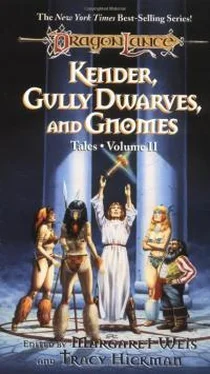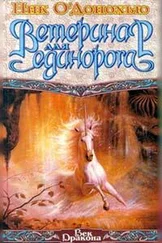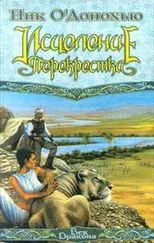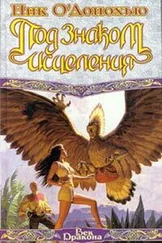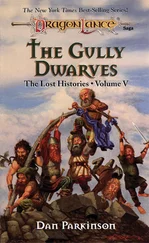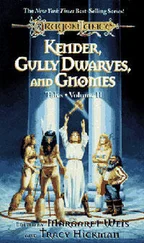Ник О'Донохью - Kender, Gully Dwarves, and Gnomes
Здесь есть возможность читать онлайн «Ник О'Донохью - Kender, Gully Dwarves, and Gnomes» весь текст электронной книги совершенно бесплатно (целиком полную версию без сокращений). В некоторых случаях можно слушать аудио, скачать через торрент в формате fb2 и присутствует краткое содержание. Год выпуска: 1987, Жанр: Фэнтези, на английском языке. Описание произведения, (предисловие) а так же отзывы посетителей доступны на портале библиотеки ЛибКат.
- Название:Kender, Gully Dwarves, and Gnomes
- Автор:
- Жанр:
- Год:1987
- ISBN:нет данных
- Рейтинг книги:5 / 5. Голосов: 1
-
Избранное:Добавить в избранное
- Отзывы:
-
Ваша оценка:
- 100
- 1
- 2
- 3
- 4
- 5
Kender, Gully Dwarves, and Gnomes: краткое содержание, описание и аннотация
Предлагаем к чтению аннотацию, описание, краткое содержание или предисловие (зависит от того, что написал сам автор книги «Kender, Gully Dwarves, and Gnomes»). Если вы не нашли необходимую информацию о книге — напишите в комментариях, мы постараемся отыскать её.
Kender, Gully Dwarves, and Gnomes — читать онлайн бесплатно полную книгу (весь текст) целиком
Ниже представлен текст книги, разбитый по страницам. Система сохранения места последней прочитанной страницы, позволяет с удобством читать онлайн бесплатно книгу «Kender, Gully Dwarves, and Gnomes», без необходимости каждый раз заново искать на чём Вы остановились. Поставьте закладку, и сможете в любой момент перейти на страницу, на которой закончили чтение.
Интервал:
Закладка:
A fictional character? Only in the widest sense, for Sturm was among the Companions and met his death, as the story says, in the Siege at the High Clerist’s Tower.
Fictional he might have been, but only in the sense that he lived by fictions—by the notions of honor and duty and compassion that have since passed from the world of Krynn. For as you see, he was none too bright. Yet Armavir remembered him fondly, for it was Sturm who insisted that the poet’s role in the Chronicles should be championed, that the truth will out as to Armavir’s discovery of the Orb at the Tower, as to the gnome’s teaching the Solamnic Knights to use the dragonlances in that dismal and beleaguered fortress—truths that died with this silly, honorable man on the fortress wall. One might detect a conspiracy of silence in his death and that of Flint, but I am generous and far from such suggestions.
He was tiresome at best, but it is to be said for him that he was also tiresome at his worst. Receive this soul to Huma’s breast, improbable as he was.
Lines 64-68: The next in a simple ... see their bottom .
Caramon. An amiable dunce, he was Armavir’s drinking companion throughout the War of the Lance and for some time afterward. Though many of Armavir’s exploits with Caramon have been forgotten by both parties, one of them must have involved the elaborate project (designed by the gnome and urged on by substantial quantities of dwarf spirits) of restoring the original Inn of the Last Home to its original height in a nearby vallenwood.
The project involved a complicated system of pulleys and winches employing wires of incredible girth and tensile strength. Needless to say, such an undertaking stirred old memories in the poet, and with those memories arose a series of increasingly severe depressions in which Armavir lay face down on the floor of the inn, paralyzed by spirits and listening in terror for the sound of distant thunder. The project was finally abandoned, and remained unacknowledged in Caramon’s rather smug preface to Leaves . All in all, though, he wasn’t a bad sort, only easily influenced.
It was for Caramon that the poet wrote “Three Sheets to the Wind [28] Legends , I, p. 94.
,” not to mention a few less successful lyrics thankfully forgotten. Line 68 contains a punning reference to one of these lesser songs—certainly Caramon’s favorite of the lot, and composed while the poet himself was hoisting still another sheet at the site of the old inn:
Dragonlance, dragonlance,
I see Tika’s underpants.
Not immortal, but high art to Caramon, who was known to faint or suffer nosebleeds when cornered and badgered into listening to “The Song of Huma [29] Chronicles . I, pp. 442-445.
” or “Crysania’s Song [30] Legends , III, p. 164.
.” Not immortal, but I fear durable enough to come back into memory and embarrass the maker. I include it only to caution those who tend to idealize historical figures: Armavir was certainly no saint, and of course the couplet was not merely a performance for Caramon’s benefit, but also contained an element of truth (see note to lines 46-50).
Lines 73-77: The next the leader ... does nothing.
Tanis (Armavir preferred infinitely his elf name “Tanthalas,” which derived from the same root as the verb “tantalize”; tantalized the half-elf was—by all the options, all the pretty faces’). As indecisive on policy as he was on matters of women (see note to line 93), Tanis often came to Armavir for advice on both fronts. Without this counsel, the quest would have turned into a kender fire drill on a number of occasions, and a tangled romantic life could have brought all Krynn to destruction.
I still have Tanis’s draft of his farewell note to Kitiara—a draft refined and expanded, as the reader knows, by more poetic hands—but the text, here printed for the first time in its entirety, will give the reader an idea of the shuttling way in which the leader of the Companions thought:
Kitiara,
Of all the days these days are filled with waiting (but there were those days four years ago, when I awaited you, and then again, those days at the last home I waited more than I had four years ago, but not as much as ... maybe I should say, of most of the days these days, of some of the days, of few, oh never mind.
His policy decisions were painful to watch. By the time the Companions had reached Solace, Tanis had taken to standing on battlements, dressed in black and holding a skull in one hand, discussing with the skull (or with Armavir, when the poet had nothing better to do or when it was not bath time among the Companions) as to which hamlet, which village the party should pass through next. But judging from the text of the letter above, the half-elf was, if possible, more pathetic in matters of the heart than in matters of the head. “Laurana or Kitiara,” he would whine, to Armavir or the skull: “Tell me which one?” To which the poet, making Tanis a party to his secret observations (see note to lines 46-50), perhaps unwittingly planted the seed of resentment that was to grow into the ingratitude with which our esteemed leader would later conceal Armavir’s contribution to history.
Line 81: After this line in Armavir’s original text, the following stanza:
The next from the intricate mountains, believing
The deed the design of the word arising
From the light on the sword, from the netted darkness,
Called like the others, but called into memory
So that the deeds rise like water from stone.
Ten they were, under the three moons,
under the autumn twilight:
As the world declined, they arose
into the heart of the story.
By this time, there should be no doubt in the reader’s mind why this stanza was excluded from the Chronicles . It was the best stanza of the poem, to boot, for it was hard for a gnome of Armavir’s natural humility to write about himself. The best stanza: no matter what the others say, I shall not compromise, shall not grovel!
Lines 82-86: The last ... the benighted.
Raistlin. Another odd fish whom the poet had little to do with at the time, having started the acquaintance on the wrong foot by making a mild joke about the eyes of this particularly humorless individual: the suggestion that if Raistlin stood on his head he could reverse the flow of Time and make us all young again was greeted with such a withering stare that for a while Armavir feared that the mage might transform him into something terribly ungnomelike—a roll-top desk or a chicken, perhaps, sent scuttling back amid the tunnels and chambers beneath Mount Nevermind, where doubtless lay many snares that had slipped from a memory damaged by both dwarf spirits and electricity.
Surely Raistlin had something to do with my being here in this cistern of a cubicle, with what is now inevitably my fate as the water keeps rising, bearing the writing table higher and higher in the drowned room until I shall be crushed among table and water and stone ... .
But again to abandon self-pity, for the truth must be championed (and shall make me free?). Raistlin did write the farewell to his brother that concludes Volume III of the Chronicles , [31] pp. 380-381.
and if he did not, I should be a fool to say otherwise. (Could it be that as I say this the water ceases to rise? An old pulley on the north wall of the cell, in danger of being submerged only a minute ago, remains dry and untouched above the surface of the pool—the water is still and unruffled as onyx—and for the first time I can see my reflection on the surface!) Raistlin was ... by far the best of them, a man of uncommon genius, whose break with the Companions stemmed mostly from his great quest for knowledge, but also, I trust, from his sense of outrage when he saw the others begin to cover Armavir’s role in the story (and now the water stands motionless—calm, dark, and limpid, thanks be to Reorx!).
Интервал:
Закладка:
Похожие книги на «Kender, Gully Dwarves, and Gnomes»
Представляем Вашему вниманию похожие книги на «Kender, Gully Dwarves, and Gnomes» списком для выбора. Мы отобрали схожую по названию и смыслу литературу в надежде предоставить читателям больше вариантов отыскать новые, интересные, ещё непрочитанные произведения.
Обсуждение, отзывы о книге «Kender, Gully Dwarves, and Gnomes» и просто собственные мнения читателей. Оставьте ваши комментарии, напишите, что Вы думаете о произведении, его смысле или главных героях. Укажите что конкретно понравилось, а что нет, и почему Вы так считаете.
